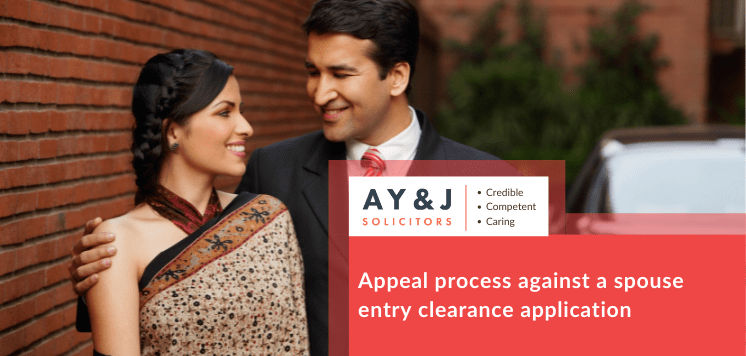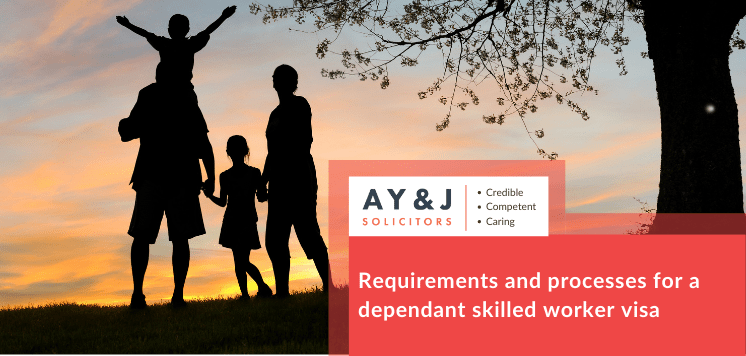Disclaimer: The information in this blog is accurate as of its publication date. Any updates after that date are not reflected here.
Several hundred spouse visa entry clearance applications get rejected every year due to one of the other reasons. There has been a 19% increase in rejections since the new immigration rules were announced in 2012.
Generally speaking, most of the refusal cases are overturned by either making a new application or appealing the refusal.
In this blog, we will extensively cover the appeal process against a spouse entry clearance application and avoid refusal and eligibility requirements for the appeal process.
Table of Contents
What is Entry Clearance?
Entry clearance is the procedure initiated by Entry Clearance Officers (ECOs) to check, before a person arrives in the UK if that person is eligible under the Immigration Rules for entry to the UK.
Under all circumstances, the authority to admit anyone to the UK ultimately rests with the Immigration Officer (IO) at the port of entry.
What are considerable grounds for refusal?
Before applying for an appeal process, it is imperative to understand what are the grounds for refusal.
The main reason for an application being refused are:
- Not fulfilling eligibility requirements (the minimum financial requirements are not met)
- The unwillingness to attend an interview if asked or to provide any information and medical reports.
- The applicant is subject of a Deportation Order.
- Previous criminal activity
- The exclusion of the applicant from the UK is conducive to the public good
- The production of false or forged documents, failure to disclose material facts in relation to the application will eventually lead to a refusal.
Understanding the UK immigration appeal
Under the fundamental principles and rules of the Law, every migrant has full access to exercising their rights to appeal and justice.
In recent years, there has been a retrenchment by the UK government in the rights to appeal for entry clearance or leave to remain.
Section 84 of the Nationality, Immigration and Asylum Act 2002 outlines the grounds of appeal to the Immigration and Asylum Chamber, which are listed below:
- the decision is not in accordance with UK immigration rules;
- the decision is unlawful by virtue of section 19B of the Race and Religion Act (discrimination by public authorities);
- the decision is unlawful under the section 6 of the Human Rights Act 1998 as being incompatible with the Convention rights;
- the appellant is an EEA national or a member of the family of an EEA national and the decision breaches the appellant’s rights under the Community Treaties in respect of entry to or residence in the UK;
- the decision is otherwise not in accordance with the law;
- the person taking the decision should have exercised differently a discretion conferred by immigration rules;
- the removal of the appellant from the United Kingdom in consequence of the immigration decision would breach the UK’s obligations under the Refugee Convention or would be unlawful under section 6 of the Human Right Act 1998 as being incompatible with the appellant’s Convention rights.
How to begin the appeal process
You can begin an appeal to the First-tier Tribunal (Immigration and Asylum Chamber) if the Home Office refused your entry clearance application on any of the above-mentioned grounds.
The process to appeal matters highly whether you are applying as an immigration expert (solicitor or an immigration adviser) or applying for yourself.
If you are applying as an immigration expert, you must apply online using the MyHMCTS service.
If you are applying on your behalf, the process will be different if the initial application was submitted while the applicant was in the UK or from overseas.
If the initial application was submitted from the UK, you will be given 14 days to appeal from the date the decision was sent.
You have 28 days to appeal after you get your decision from outside the UK. If you have to leave the country before your appeal, you have 28 days to appeal once you have left the country.
If you apply after the deadline, you must explain the reason for the delay. The tribunal will decide if it can still hear your appeal.
You can ask on your appeal form for a decision to be made either:
- on the information in your appeal form and any documents supplied to the tribunal
- at a hearing that you and your representative can attend
The tribunal can decide whether to go ahead with a hearing even if you do not ask for one. If the tribunal does not hold a hearing, the judge will decide based on the appeal form and document supplied to the tribunal.
Hearings are generally held in public; you can also request a private hearing via video link but you must have a reason.
Fees
The Tribunal costs to lodge an appeal are as follow:
- £80 without a hearing
- £140 with a hearing
You may not be required to pay if you have access to:
➔ asylum support
➔ legal aid
➔ services from your local council and you are below 18 years of age
Route to Judicial review
Article 8 of the European Convention on Human Rights specifies ‘Right to Respect for Private and Family Life’
Everyone has the right to respect for his private and family life, his home and his correspondence. There shall be no interference by a public authority with the exercise of this right except such as is in accordance with the law and is necessary in a democratic society in the interests of national security, public safety or the economic well-being of the country, for the prevention of disorder or crime, for the protection of health or morals, or for the protection of the rights and freedoms of others. If UKVI is found to have made a decision which is in breach of their obligations under Article 8, immigration rules and/or policy guidance, it may be forced to re-examine the decision and grant leave to remain.
The judicial review is considered to be the last recourse. It is the process where the courts review the legitimacy of a decision made by a public body. It challenges the methods by which the decision has been made, rather than looking at the rights or wrongs of the consequences.
Suppose the UK Home Office has refused an application for entry clearance and has not granted a right of appeal against the refusal of the application. In that case, there is a possibility, a refusal can be challenged within 90 days from the date of receiving the refusal letter.
According to the Civil Procedure Rules, a Pre-Action Protocol (PAP) notice must be sent to the UK Home Office, giving them at least 14 days to review the decision and amend their decision considering the information and documentary proofs submitted through the Pre-Action Protocol letter. If the decision is maintained, then the applicant can procced to judicial review.
Conclusion: The UK immigration appeal process is undoubtedly complex and rigorous. The Home Office has grown even stringent when ensuring that every migrant fulfils the entry clearance requirements. Failing to meet them could lead you to face refusals.
This blog successfully highlights how you can avoid refusals by understanding the considerable grounds, how you can begin an appeal, if you have encountered refusal and the last resort of judicial review, challenging the decision by a public body.
It is indispensable to understand the necessary guidance and thoroughly consider avoiding refusal or successfully overturn the decision.
Speak to Expert for UK Spouse Visa Refusal Appeal Process









